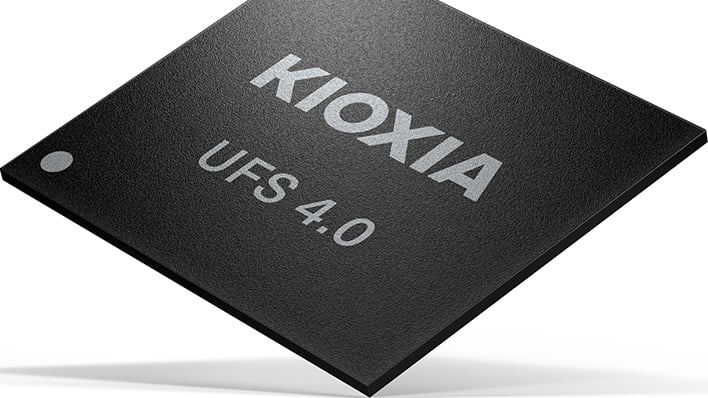
Don’t you hate it when companies skimp on storage? We’re looking at you, Apple, but not only you. Part of the reason (beyond greed) is a balance between cost and capacity, with whatever storage options are available at any given moment. In a move that could see manufacturers beef up the baseline storage on future devices, Kioxia today announced its has begun mass producing what it says is industry’s first Universal Flash Storage (UFS) 4.0 embedded memory devices in quad-level cell (QLC) form.
QLC memory packs 4-bits per cell, and you don’t need a math degree to figure out that it has a higher bit density than traditional triple-level cell (TLC) UFS, which is 3-bits per cell. According to Kioxia, advancements in both controller and error correction technologies have paved the way for QLC-based UFS 4.0 memory with “competitive performance” to TLC.
Putting numbers to the claim, Kioxia says its QLC UFS 4.0 chips are rated to deliver up to 4,200MB/s of sequential read performance and up to 3,200MB/s of sequential write performance, thereby fully utilizing the UFS 4.0 interface. Kioxia achieves this by pairing its own BiCS Flash 3D memory chips and controller in a standard JEDEC package.
There’s also a cost advantage to going with QLC, which in turn could lead to mobile devices with more storage at the same or similar price points.
“Kioxia’s introduction of the industry’s first QLC UFS Ver. 4.0 devices underscores our commitment to pushing the boundaries of storage technology,” said Maitry Dholakia, vice president, Memory Business Unit, Kioxia America, Inc. “By leveraging QLC technology, we are able to deliver higher densities and cost efficiencies, enabling our customers to meet the growing demands of today’s data-intensive applications while maintaining exceptional performance standards.”